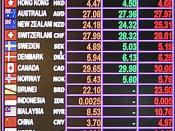International finance plays a fundamental role in the global economy. Currency conversion rate changes are the most obvious risk of conducting business internationally. Foreign exchange rate is the amount of one currency needed to purchase one unit of another. (Brealey, Myers, and Marcus, 2003) When a company begins a transaction in a foreign currency, it accepts any economic risk due to fluctuating exchange rates. The globalization of the world economy and the devaluation of the U.S. dollar have allowed more American companies to enter the export/import markets. Additionally, many companies are finding that international transactions can make them more competitive in marketing products and procuring parts and materials. However, any company engaged in overseas business should be aware of the risks of currency fluctuations.
Companies that enter the foreign market and foreign investors must deal with the risk created by volatile foreign currencies. Participation in international markets may result in a foreign exchange risk known as transaction exposure.
This risk occurs when a company has a payable or receivable denominated in a foreign currency. The risk lies in the fluctuation of the foreign currency exchange rate. Exchange rates between most currencies regularly fluctuate, and there is a time lag between entering into a contract and making the payment. For example, if the foreign currency appreciates before the liability is settled, the company spends more dollars to purchase the foreign currency needed to settle this liability. As a result, the company will experience a foreign exchange loss. On the other hand, a company with a liability position in a weakening foreign currency will experience a foreign exchange gain between the date the liability is incurred and its settlement. Exchange rate risk is simple in concept as a potential gain or loss that occurs as a result of an exchange rate change.


